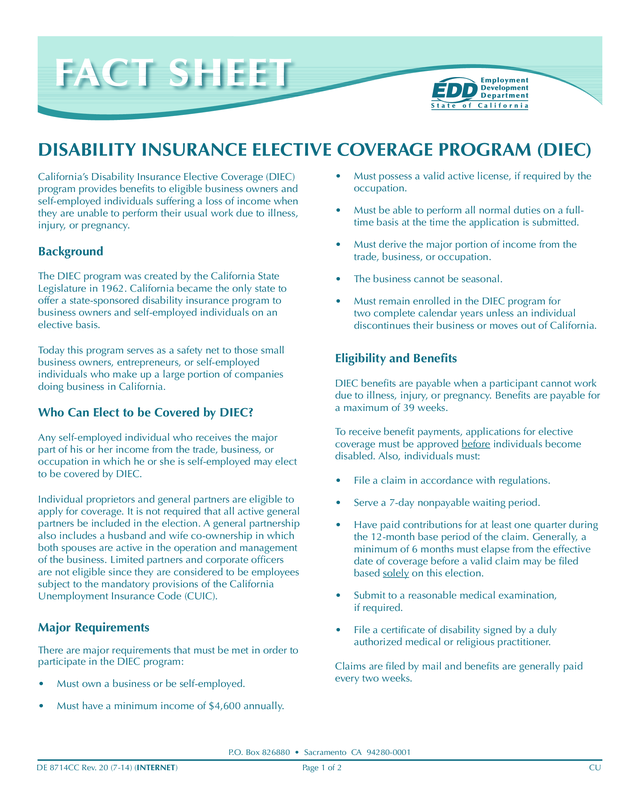Fillable Printable Fact Sheet - Disability Insurance Elective Coverage Program (Diec) (De 8714Cc)
Fillable Printable Fact Sheet - Disability Insurance Elective Coverage Program (Diec) (De 8714Cc)

Fact Sheet - Disability Insurance Elective Coverage Program (Diec) (De 8714Cc)

DE 8714CC Rev. 20 (7-14) (INTERNET) Page 1 of 2 CU
DISABILITY INSURANCE ELECTIVE COVERAGE PROGRAM (DIEC)
California’s Disability Insurance Elective Coverage (DIEC)
program provides benefits to eligible business owners and
self-employed individuals suffering a loss of income when
they are unable to perform their usual work due to illness,
injury, or pregnancy.
Background
The DIEC program was created by the California State
Legislature in 1962. California became the only state to
offer a state-sponsored disability insurance program to
business owners and self-employed individuals on an
elective basis.
Today this program serves as a safety net to those small
business owners, entrepreneurs, or self-employed
individuals who make up a large portion of companies
doing business in California.
Who Can Elect to be Covered by DIEC?
Any self-employed individual who receives the major
part of his or her income from the trade, business, or
occupation in which he or she is self-employed may elect
to be covered by DIEC.
Individual proprietors and general partners are eligible to
apply for coverage. It is not required that all active general
partners be included in the election. A general partnership
also includes a husband and wife co-ownership in which
both spouses are active in the operation and management
of the business. Limited partners and corporate officers
are not eligible since they are considered to be employees
subject to the mandatory provisions of the California
Unemployment Insurance Code (CUIC).
Major Requirements
There are major requirements that must be met in order to
participate in the DIEC program:
• Must own a business or be self-employed.
• Must have a minimum income of $4,600 annually.
P.O. Box 826880 • Sacramento CA 94280-0001
• Must possess a valid active license, if required by the
occupation.
• Must be able to perform all normal duties on a full-
time basis at the time the application is submitted.
• Must derive the major portion of income from the
trade, business, or occupation.
• The business cannot be seasonal.
• Must remain enrolled in the DIEC program for
two complete calendar years unless an individual
discontinues their business or moves out of California.
Eligibility and Benefits
DIEC benefits are payable when a participant cannot work
due to illness, injury, or pregnancy. Benefits are payable for
a maximum of 39 weeks.
To receive benefit payments, applications for elective
coverage must be approved before individuals become
disabled. Also, individuals must:
• File a claim in accordance with regulations.
• Serve a 7-day nonpayable waiting period.
• Have paid contributions for at least one quarter during
the 12-month base period of the claim. Generally, a
minimum of 6 months must elapse from the effective
date of coverage before a valid claim may be filed
based solely on this election.
• Submit to a reasonable medical examination,
if required.
• File a certificate of disability signed by a duly
authorized medical or religious practitioner.
Claims are filed by mail and benefits are generally paid
every two weeks.

What is the Cost?
Premiums are based on net profit reported on Internal
Revenue Service (IRS) Schedule SE or schedule C. Each
quarter, one-fourth of this amount is reported as “wages.”
Premiums are calculated at a percentage of these “quarterly
wages.”
If the participant becomes disabled for a portion of the
quarter, premiums may be reduced.
The DIEC rate is evaluated and computed on or before
November 30 of each calendar year to ensure program
solvency.
The state makes no revenue on this plan. Therefore,
premiums are based on benefits paid and administrative
costs.
Disqualifications
The DIEC program is committed to program integrity and
will take all possible measures to detect and deter fraud
and protect benefits.
No disability insurance payments can be made to persons
who willfully make false statements or withhold material
facts to gain benefits.
A disabled participant is also ineligible for disability
benefits:
• If coverage has been terminated prior to becoming
disabled (there is no vested interest).
• When in legal custody as the result of a conviction,
or when confined by a court order.
• If the participant is no longer in business.
• If a quarterly contribution return is delinquent.
Appeals
All participants have the right of appeal to an impartial
Administrative Law Judge (ALJ) concerning determinations
of eligibility or benefit amounts. Further appeal from
an ALJ’s decision may be filed with the Unemployment
Insurance Appeals Board, or the Board may set aside the
ALJ’s decision on its own motion. Decisions of the Board
may be reviewed by the courts.
Social Security
If a person is permanently disabled, he or she should
contact the Social Security Administration for information
about benefits under its programs. For additional
information, call the Social Security Administration at
1-800-772-1213.
Paid Family Leave
Persons covered by DIEC are also automatically covered by
Paid Family Leave (PFL) insurance. PFL benefits are available
to persons who take time off work to care for a seriously
ill child, parent, parent-in-law, grandparent, grandchild,
sibling, spouse, or registered domestic partner or to bond
with a new child. (Please see the Paid Family Leave Fact
Sheet, DE 8714CF, for further information.)
For More Information
For additional information on the DIEC program, visit the
EDD’s website at www.edd.ca.gov, contact your nearest
Disability Insurance office listed under “Employment
Development Department” in the State Government section
of your telephone directory, or call the DIEC Unit at
916-654-6288.
DE 8714CC Rev. 20 (7-14) (INTERNET) Page 2 of 2 CU
The EDD is an equal opportunity employer/program. Auxiliary aids and
services are available upon request to individuals with disabilities.



